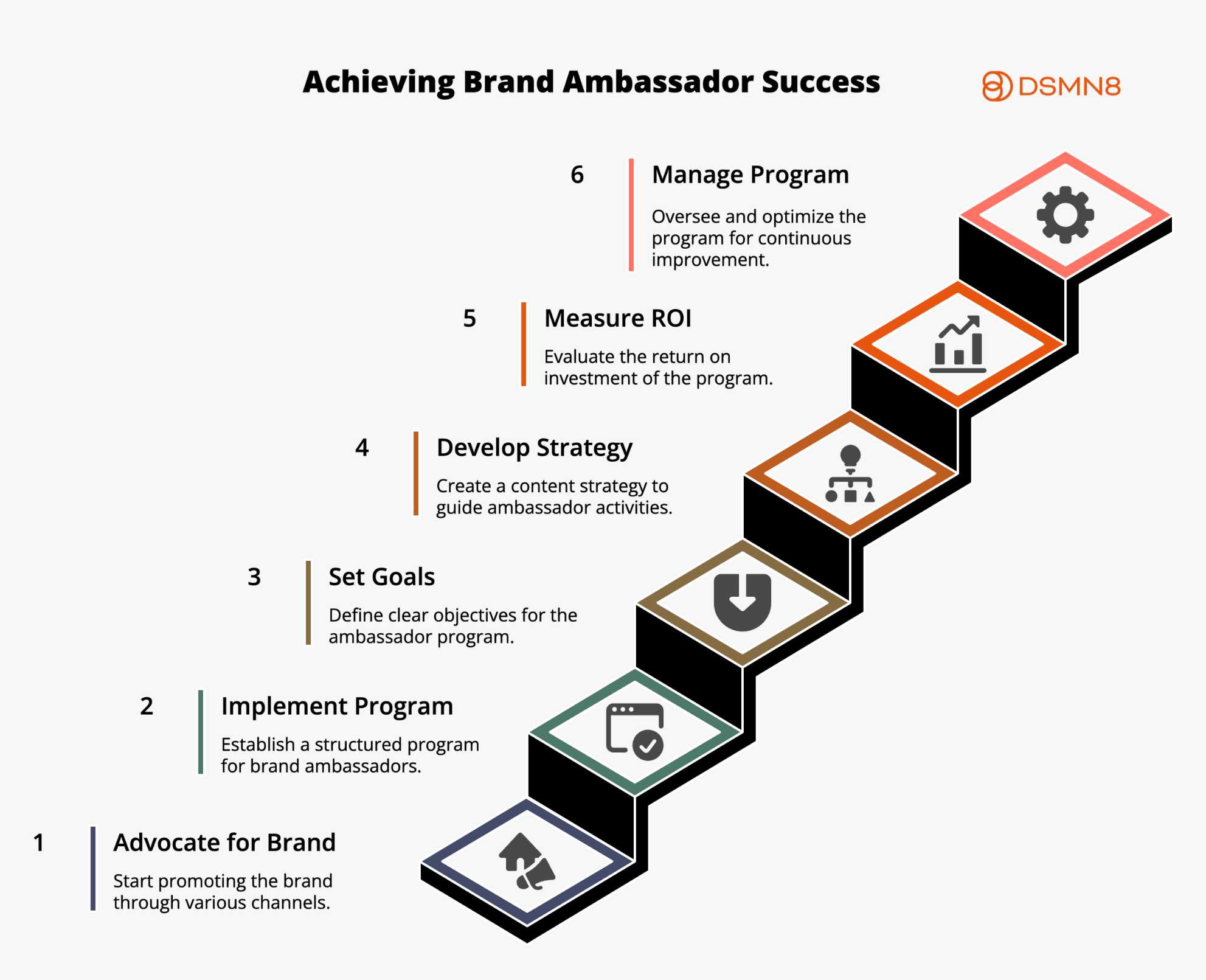
Last updated: 13th October 2025
Kim Kardashian, Gigi Hadid, LeBron James… These are just some of the names that typically spring to mind when we think about brand ambassadors.
You wouldn’t be wrong, because historically, what we’ve known to be a brand ambassador has only ever been associated with/useful to B2C organizations.
It was someone with a great following, a level of name recognition to match, and was typically a celebrity, a reality star, or a sports personality.
However, the tides are beginning to change. We now have social media platforms in abundance, meaning that just about anyone can become a reputable brand ambassador, making brands less dependent on celebrity endorsements.
Most notably, B2B organizations are beginning to capitalize on this, too.
Here’s everything you need to know about brand ambassadors: what they do, how to become a brand ambassador, and how companies are leveraging them on social media.
What is a brand ambassador?
A brand ambassador is a person who promotes an organization and its products or services to their network/followers to drive sales and increase brand awareness.
Who can be a brand ambassador?
Quite frankly, anyone can be a brand ambassador.
However, determining whether it would be the right path for you would mean considering your goals, the objectives of the business and your role.
As a general rule, employees who are regularly posting to social media, engaging with their networks, and generating engagement are likely to be the most effective brand ambassadors.
They can easily be identified by simply searching your company name on social media to see who’s talking about you, or searching company-relevant hashtags on just about any major social media site.
📊 Want to see how active your employees are on LinkedIn and how this compares with your competitors? Get a free competitor analysis review to find out.
Here are some examples of how brand advocacy could impact your department 👇
1. Sales
In the ever-changing world of sales, you’ve probably seen the term ‘social selling’ floating around. It seems to be all the rage in sales, given that social media is our most prominent form of communication.
Advocating for your company on social media is a fantastic way to shorten your sales cycle, build trust and rapport, and ensure you are the first person a prospect thinks of when they are ready to buy.
Get people to engage with your company content by sharing the latest company news, insights from conversations you had, or industry reports. Perhaps you’ve just rolled out a campaign that you want to shout about, or maybe another department within the company is doing something exciting.
Use these moments to advocate for your company and prove why you’re leading that industry.
2. Marketing
If you work in marketing, lead generation, and elevating brand awareness are, no doubt, your two primary goals.
Becoming a brand ambassador will significantly increase inbound leads as part of your B2C or B2B inbound marketing strategy.
Having an army of brand ambassadors means you can elevate your content marketing and reach people beyond your corporate accounts.
People within your network are more likely to engage with your content, too, as people are 76% more likely to engage with someone they know on social media.
They are generating clicks, comments, and likes.
And don’t forget, becoming a brand ambassador yourself, or having a team of employee ambassadors, can be an invaluable tool for lowering your media spend.
The employee advocacy benchmark report 2025 revealed that 23% of organizations are already achieving a cost-per-click under $1 from their programs.
3. HR
Employer branding has never been more relevant than in the age of social media.
Every successful company will have accounts on most major social networks that allow them to demonstrate their company culture. And there’s no better or more organic way to showcase your company culture than through your employees.
Positive employer branding helps both attract and retain quality employees, who are crucial to the success and growth of the business.
It’s also essential for how customers and prospects view your company. Like it or not, top candidates will be reading reviews on the likes of Glassdoor and Fairygodboss to learn more about your company.
In fact, 91% of all employers are using social media as part of their hiring process.
Having a legion of brand ambassadors authentically showcasing your company culture means you can control the narrative.
4. Production
If you’re someone who works in product development, product design, engineering, or any of the above, advocating for your brand on social media can be a great way to display thought leadership or become known as an opinion leader.
Sharing your expertise with your network lets those in the industry know why your organization and the products/services you offer are indeed the best in market. It’s the most effective form of word-of-mouth marketing!

How can I get results with brand ambassadors?
Well, put simply, the best way to drive results as a brand ambassador is to start advocating for your company and industry.
Whether it’s on social media, in person, or over the phone, the first step is to start talking about what you do to represent the brand.
However, for a company (particularly a larger organization) to see and measure results, you would be wise to implement a brand ambassador program.
A program will simplify and streamline the process, allowing you to see results in real time and measure the ROI of your efforts.
To succeed with employee brand ambassadors, you’ll need to set goals, implement a content strategy, and make it as easy as possible for employees to become the face of your brand.
For comparison, think about why an organization would choose to implement a CRM like HubSpot.
Without a CRM, it becomes nearly impossible to manage a sales team of any size effectively.
No matter how organized your SDRs and Account Executives may be.
The same rules apply to your ambassador program. It needs to be measured, attributed, incentivized, and managed.

How can I get started with brand ambassadors?
One of the first things to do when considering this kind of program is to determine whether or not it would be suitable for your organization.
At DSMN8, we’ve got a fantastic track record of guiding brands, big and small, to success with their content marketing, employee advocacy, and content creation.
However, not every company will have an abundance of employees who are active on social media.
A great place to start is by grabbing that free report I mentioned before.
Once you’ve determined this, you’ll need to consider your options and decide which employee advocacy vendor would be best for you.
Frequently Asked Questions
1. What does a brand ambassador do?
A brand ambassador represents a company or organization in a positive light, helping to promote its message, products, or services. This often includes sharing branded content on social media, attending events, or simply speaking positively about the brand in professional settings.
2. Can employees be brand ambassadors?
Yes, employees make some of the best brand ambassadors. They know the brand inside out, have credibility among their peers, and their advocacy is seen as more authentic and trustworthy compared to external influencers.
3. What are the benefits of becoming a brand ambassador?
Being a brand ambassador can boost your personal brand, improve your visibility in your industry, and help you develop leadership and communication skills. It can also lead to increased recognition within your company or industry.
4. Is a brand ambassador the same as an influencer?
Not exactly. While both promote brands, ambassadors usually have a deeper, long-term relationship with the company and may be internal team members. Influencers are typically external partners who promote brands for compensation, often on a campaign basis.
5. Do brand ambassadors get paid?
It depends. Some brand ambassador programs offer incentives like bonuses, recognition, or free products. Others, especially internal ambassador programs, reward participants with career development opportunities or internal visibility rather than direct payment.
6. How can I become a brand ambassador for my company?
Start by engaging with your company’s content on social media, sharing updates, and offering to represent the brand at events or in thought leadership pieces. Many organizations also run formal ambassador or advocacy programs that you can apply to join.
Additional Resources
DSMN8 has the resources to aid you every step of the way, whether you decide to work with us or not!
You can download our Ultimate Guide to Employee Advocacy, sign up for the free Employee Advocacy Course, or even check out our CEO’s book, Employee Advocacy: 101 Cheat Codes.
I recommend starting with the Ultimate Guide, which contains a buyer’s guide, the business case, infographics, checklists, and much more.
DSMN8 is already helping brands of all sizes turn their employees into authentic brand ambassadors, content creators, and full-blown influencers. Our client list includes General Motors, Huawei, and AkzoNobel, so you’ll be in good company. We’d be more than happy to help you every step of the way.
Ready to get started with the #1 employee advocacy platform?
Wondering how active your team already is, and how this compares with your competitors?
Lewis Gray
Senior Marketing Manager and Employee Advocacy Program Manager at DSMN8. Lewis specialises in content strategy, growing brand visibility and generating inbound leads. His background in Sales lends itself well to demand generation in the B2B niche.




